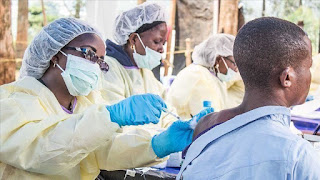By Omoniyi Wasiu Abiodun and Gabriel Oke
Since the coronavirus outbreak in Wuhan has become a global threat claiming more than a hundred thousand lives across the globe, the medical experts, most especially, the Medical Laboratory Scientists, Doctors and Nurses have been working fervently to find a solution to this ravaging pandemic.
Although more than five hundred thousand corona victims have been discharged worldwide, the recuperative credibility of these survivors has to be a subject of further scrutiny.
Can a recovered coronavirus victim be re-infected again by the disease?
This question can best be answered by understanding the virus itself, and how another virus of the same family as COVID-19 operates.
- COVID-19 also known as Severe Acute Respiratory Syndrome Coronavirus 2 (SARS-CoV-2) is the seventh member of the coronavirus family that infects human after Severe Acute Respiratory Syndrome coronavirus (SARS-CoV) and the Middle East Respiratory Syndrome coronavirus (MERS-CoV).
- They have enveloped viruses with positive-sense single-stranded RNA genome with a nucleocapsid of helical symmetry.
- They have club-shaped protein spikes projecting from their surface, which in electron micrograph creates an image similar to solar-corona or crown-shape from which they derive their name.
- They pneumonia-like infections (viral pneumonia and secondary bacteria pneumonia) and bronchitis but other symptoms like fever, sore throat and common cold may occur.
- Coronaviruses vary significantly in risk factors. While some kills 30% of those they infect (as in MERS-CoV, SARS-CoV, SARS-CoV-2), some are relatively harmless (Human coronavirus –OC43, -HKU1, -229E, -NL63).
Pathogenesis of COVID-19
The interactions of the coronavirus spike protein with its complementary host cell receptor is central in determining the tissue tropism, infectivity, and species range of the virus e.g. SARS-Corona virus infects the human cells by attaching to the angiotensin-converting enzyme 2 (ACE2) receptor through clathrin-mediated endocytosis.
Pathological findings of COVID’19 reveals that the over activation of T-cells, manifested by an increase in Th17 and high cytotoxicity of CD8 T-cells, partially account for severe immune injury. A study showed that COVID-19 nucleic acid can be detected in faeces and urine of infected patients suggesting that it may also be transmitted through the faecal-oral route.
Now, it is unclear whether people who recover from COVID-19 will be immune to reinfection from the coronavirus or not and if so, how long will that immunity last? But it is understandable that reinfection is an issue with the four seasonal human coronaviruses (-OC43, -HKU1, -229E, -NL63) that causes the common cold. These coronaviruses that cause this common cold seem to be able to make people sick again and
A medical researcher, Ann Falsey of University of Rochester Medical Center, said “Almost everybody walking around, if you were to test their blood right now, they will have some levels of antibody to the four different coronaviruses that are known to cause common cold but after infection with one of these viruses, antibodies are produced but then the level slowly declines and become susceptible again.
It is possible that for some reasons, according to research, that the body’s immune system response to these dangerous coronaviruses is just not robust or that these coronaviruses possess some features that inhibit the body system from developing long term immunity, that’s why the response to these viruses by immunoglobulin G (IgG) and immunoglobulin M (IgM) is very slow, as they have the ability evade the immune system.
Still, it is hard to predict how the survivor’s body will react if they are exposed to SARS-CoV-2 (COVID-19) virus again, but for the fact that there is every possibility that people get reinfected with common cold over and over again, even though the immune system has been sensitized since childhood, it is very possible people get reinfected with COVID-19 if they get exposed to it again.
Although, the survivors of this pandemic should not panic with this development, if they can abide by the laid down rule of the medical experts by washing their hand frequently, staying indoors, and avoid social gatherings, it is not likely they get infected the second time if not, there is every possibility that they would get reinfected the second time.
Omoniyi Wasiu Abiodun and Gabriel Oke (Department of Medical Laboratory Science, Ladoke Akintola University of Technology, Ogbomoso).







